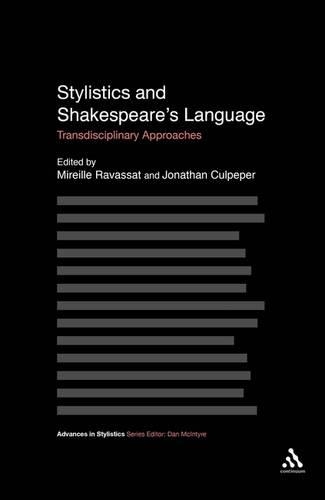
Stylistics and Shakespeare's Language: Transdisciplinary Approaches
(Paperback)
Available Formats
Publishing Details
Stylistics and Shakespeare's Language: Transdisciplinary Approaches
By (Author) Dr Mireille Ravassat
Edited by Dr Jonathan Culpeper
Continuum Publishing Corporation
Continuum Publishing Corporation
2nd June 2011
United States
Classifications
Professional and Scholarly
Non Fiction
Literary studies: c 1600 to c 1800
Semantics, discourse analysis, stylistics
822.33
Physical Properties
Paperback
288
Width 156mm, Height 234mm
440g
Description
This innovative volume testifies to the current revived interest in Shakespeare's language and style and opens up new and captivating vistas of investigation. Transcending old boundaries between literary and linguistic studies, this engaging collaborative book comes up with an original array of theoretical approaches and new findings. The chapters in the collection capture a rich diversity of points of view and cover such fields as lexicography, versification, dramaturgy, rhetorical analyses, cognitive and computational corpus-based stylistic studies, offering a holistic vision of Shakespeare's uses of language. The perspective is deliberately broad, confronting ideas and visions at the intersection of various techniques of textual investigation. Such novel explorations of Shakespeare's multifarious artistry and amazing inventiveness in his use of language will cater for a broad range of readers, from undergraduates, postgraduates, scholars and researchers, to poetry and theatre lovers alike.
Reviews
This is a book full of fresh and illuminating perspectives and methods. It makes you realize the study of Shakespeare's language is only just beginning. -- David Crystal, Honorary Professor of Linguistics at Bangor University, UK
A welcome addition to the still relatively meagre output of books on Shakespeare's style. The chapters by different contributors take a fresh and insightful look at vocabulary, metre and rhetoric in the light of recent advances in stylistics. -- Katie Wales, Special Professor, School of English, University of Nottingham, UK
The eleven articles included jointly offer an impressive scope of scholarship, catering to various literary and linguistic tastes, while bringing the multi-level nature of Shakespeare's style clearly into focus... The volume is an important contribution to scholarship, on several levels... The various linguistic aspects of Shakespeare's texts work cohesively together to create meaning. They are all needed in order for the overall idea to emerge. To appreciate the 'holistic' message, one needs to look at all the parts. This volume shows how it can be achieved. -- Barbara Dancygier, University of British Columbia * English Text Construction (Vol. 6:1) *
Author Bio
Mireille Ravassat is a Senior Lecturer in the Department of English Language at Valenciennes University, France
Jonathan Culpeper is Professor of English Language and Linguistics at Lancaster University, UK
